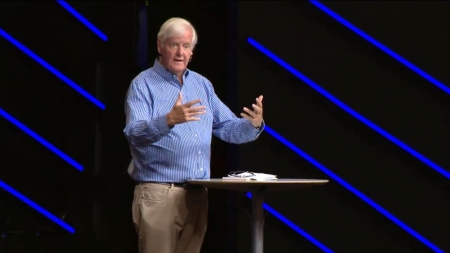Os Guinness: evangelical critics of Trump are 'dead wrong,' 'haven’t analyzed the situation rightly'

Evangelical critics of President Donald Trump and his supporters are “dead wrong” in their prioritizing of concerns, according to British author and social critic Os Guinness.
Conservative Christian radio host and author Eric Metaxas interviewed Guinness on Metaxas’ podcast that aired on Tuesday, partly in regards to Guinness’ newest book, Last Call for Liberty: How America's Genius for Freedom Has Become Its Greatest Threat.
During the interview, Metaxas bemoaned the backlash he received from fellow Christians over his support for Donald Trump over Hillary Clinton in the 2016 election.
“I was vilified and since have been vilified as everything under the sun. Even my fellow Christians, or I should say, especially many of my fellow Christians, have said things I would have thought them incapable ever of saying,” said Metaxas.
“You have many people who are professing evangelical Christians, serious Catholic Christians, who are as anti-Trump as Alexandria Ocasio-Cortez. That, to me, is the darkest of this, because I would think that the church would understand that the unborn and a number of other things are vitally important. Something has changed.”
Guinness said he agreed with Metaxas on his assessment, saying that he believed anti-Trump evangelicals and Catholics “haven’t analyzed the situation rightly.”
“They’ve become obsessed with Trump, and they’ve failed to see that he’s not the cause of the problem, he’s the consequence, the symptom,” Guinness responded.
“While they’re being obsessed with him, the real problems are developing underneath. And Trump won’t be forever. So he serves out two full terms and finishes in whatever way. Then you would still have the problem.”
Labeling many of the evangelical and Catholic critics “friends” of both himself and Metaxas, Guinness went on to state that he felt they were “dead wrong” about their focus on Trump.
Metaxas then added that he found it “horrifying” that many of these evangelical critics of Trump were “demonizing” supporters of the president, arguing that their statements prevent civil discourse.
“They think that everyone who is a sane person must be viciously against Trump. If you’re not that, then you’re not part of the crowd anymore. And so, you can’t even talk to those people,” continued Metaxas.
Guinness believed that Christians needed to adopt “a better analysis of what’s gone wrong” in the United States and to “respond to it in a much more Christian way” than attacking Trump supporters.
Better public discourse can emerge if Americans would “get it out of just the obsession with Trump” to better think about pressing issues, like whether to build a wall on the southern border, Guinness added.
“You think of the wall and the fact that here’s a position which so many of the leading Democrats supported themselves, for the right reasons, not that long ago,” said Guinness. “Now because Trump’s in favor of it, they can’t possibly admit anything like that. Well, this is an insanity for the nation.”
Released last October by InterVarsity Press Books, Guinness’ Last Call for Liberty focuses on his concern about the recent decline in political civility.
“Our society's conflicts are rooted in two rival views of freedom, one embodied in ‘1776’ and the ideals of the American Revolution, and the other in ‘1789’ and the ideals of the French Revolution. Once again America has become a house divided, and Americans must make up their minds as to which freedom to follow,” reads the book’s Amazon description.
“[Guinness] calls for a national conversation on the nature of freedom, and poses key questions for concerned citizens to consider as we face a critical chapter in the American story. He offers readers a checklist by which they can assess the character and consequences of the freedoms they are choosing.”
Metaxas recently garnered controversy for his interview last week with controversial right-wing figure Milo Yiannopolis, with Andrew Egger of The Bulwark joking that it proves “we live in the worst possible timeline.”
“What’s interesting is how quickly it becomes clear that Metaxas—although he has apparently read and enjoyed Diabolical—seems to be blissfully unaware of most of the more revolting moments in the Milo oeuvre,” wrote Egger.
“In a sense, though, Metaxas has done a real service by hosting Milo: He made clear that the political corruption of the modern evangelical movement is in its very late stages. Metaxas is for Trump. Milo is for Trump. So Metaxas assumes that he should be for Milo, too.”





















